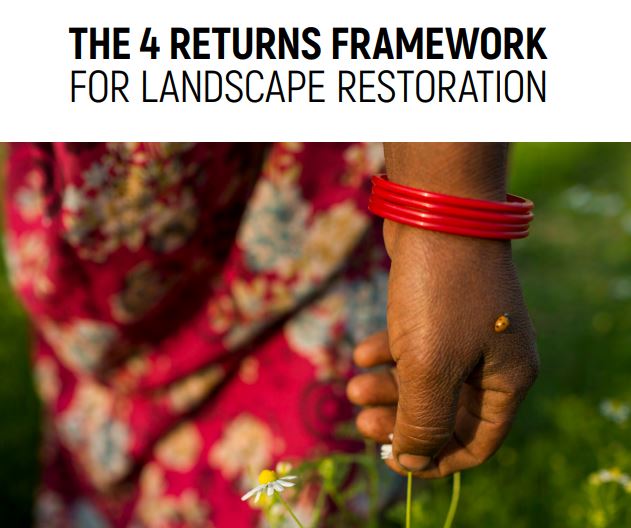In the Netherlands, environmental restoration group Commonland has issued their latest report.
Here is the Executive Summary:
Concern about the environment has moved decisively from niche to mainstream. Although carbon markets are coming up to speed, shareholders are asking business to become carbon neutral, massive tree planting campaigns have started, and circular economic thinking is taking off, the current attempts to address the biodiversity and climate crisis continue to fail.
We need a common language and new approaches, that inspire optimism, long-term solutions and systemic change at scale. All are inherent in rebuilding resilient living landscapes, our global life support system.
The 4 Returns Framework for landscape restoration is a practical tested system-change framework used by stakeholders to undertake a landscape approach. It seeks to balance competing stakeholder demands in a mosaic of different management approaches, to supply
a full range of natural, social and economic returns.
Successful holistic landscape restoration is a long-term endeavour that only works if it is grounded and owned by the people in the landscape. Finding the balance between top-down decision and inclusive bottom-up approaches to ecosystem restoration is critical to success.
The 4 Returns Framework connects ecology, community values, spirit and culture, business and long-term economic sustainability at landscape level. It allows government, business and communities to co-create and deliver a common vision for a resilient landscape:
- It is a conceptual and practical framework to help
stakeholders achieve 4 RETURNS (inspiration, social
returns, natural returns, financial returns); - by following five processes (5 ELEMENTS: a
landscape partnership, shared understanding,
landscape vision and collaborative planning, taking
action, and monitoring and learning); - within a multifunctional landscape (3 ZONES: natural,
combined and economic zones); - with this transformation taking place over a realistic
time period (MINIMUM 20 YEARS).
The 4 Returns Framework supports achievement of most of the Sustainable Development Goals and is itself based particularly around SDG 17 (building partnerships).
Social tools can help stakeholders navigate this rather complex process: neither simply leading from the front, nor handing decision-making over to someone else. Theory U is an example of a practical and powerful method for cocreation, sensing, exploring, guiding and managing group processes, systematically reaching out to the inner purpose of people.
Cases are described from India, Fiji and Spain to demonstrate these principles in practice. ‘Use cases’ explain what this means for governments, communities, and the business and finance sectors.
The 4 Returns Framework is not a utopian dream; it is a practical approach that works in the real world, with real people, within conventional social, corporate and government frameworks. It represents a distillation of wisdom that has been brought together over many years and has been tested in practice.
The aim of this report is asking others to join us in using this common language to scale up restoring billions of degraded hectares and together healing the relationship between people and within ourselves.

